Except that it flies against the design of the game, which is that you AREN'T playing on the geography of the real world, so what resources you do or do not have access to is determined by geography.
The idea that there should be balanced biomes where lack of strategic resources are counterbalanced by other advantages is great. The idea that this should be forced on specific civ is horrendous level of determinism, and well worth the name "terrible idea".
(As to Iron, the main reason for the lack of metalworking for weapons and other sharp tools seems to have largely come down to the prevalence of obsidian: obsidian blades, while very brittle, could achieve sharpness that easily matched or exceeded easily available metals, so there was little push to make weapons or cutting tools out of metal, and, as a result, little push to explore more advanced metallurgy. It's only once they encountered those stronger metals, which were in fact as sharp as or sharper than obsidian and a whole lot less brittle (not to mention armors made of the same), that they realized the advantage of that path. Instead, Mesoamerican metallurgy focused on producing copper alloys for ornamental and symbolic purposes, altering coloration among other things.
So, not a lack of eureka, not a lack of research or capacity to reflect on the use of their material, but simply going down a different technological path that made more sense given the available resources and their needs.)
Agree on the real world historical part, but I think some parts sound uncalled for.
-
"Againts the design of the game", equally ballanced starting positions in a random map is the general design for CIV (is a sandbox game), still the suggestion here is realy easy to achieve as a
mode that put the player in a difficult disadvantageous start, something that is quite common content for CIV players (just look to Youtube videos about challenging gameplays).
-
"Simply going down a different technological path", meanwhile this is not simpler neither more in-design for the game, something like this would depart more from CIV formula and would need way more ballance. We can allways point X or Y examples of technologies that did not followed the western-centric historical path but the game use this model also for game design and ballance reasons, the amount of possible alternate ways and sequences of technologies mean a lot more of effort including many possible routes that dont even have historical precedents. Worse in this case since is directly related to
militar units.
-
"The idea that this should be forced on specific civ is horrendous level of determinism", OK, but my whole post was about how in game this could be used for
any civ starting in an isolated disadvantageous position, nuancing
@Krajzen idea that could be interpreted the other way. So there is NO civ forced by its
name but a challenging starting position for any player that want an extra difficult mode.
-
"Simply going down a different technological path that made more sense given the available resources and their needs", so in the example of implement Bronze/Iron instead of Obsidian how would be implemented
in-game the mechanic to make
more sense this technological change?
I dont see real value investing in alternate tech paths when yourself point the average ballanced random map/starting postition as part of CIV design, that would put all civs on the same area next to each others, turning your
"they realized the advantage of that path" in the immediate outcome the moment any civ achieve metal weapons.
 But thx for the input by the way, it's cool.
But thx for the input by the way, it's cool.
 Except your choice of civilization was not engaging you in anything except city names and the names of your neighbours. (culturally linked starting locations) But the world was far greener, you had far more space to expand with settlers (I like to expand), and city-States were not a thing. Barbs were more rare too.
Except your choice of civilization was not engaging you in anything except city names and the names of your neighbours. (culturally linked starting locations) But the world was far greener, you had far more space to expand with settlers (I like to expand), and city-States were not a thing. Barbs were more rare too.
